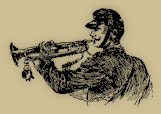The Descendants Of Thomas Sims Graves
of Virginia, Fayette, and Nelson County Kentucky
Relics
'Taps'
 The account below is said to be an urban legend, if it were true, it would be a stirring tribute to the valor and respect for those who fought on both sides of the Civil War. The actual account of the origin attributes the song to Brigadier General Daniel Butterfield, a Civil War general who commanded the 3rd Brigade of the 1st Division of the Army of the Potomac.
The account below is said to be an urban legend, if it were true, it would be a stirring tribute to the valor and respect for those who fought on both sides of the Civil War. The actual account of the origin attributes the song to Brigadier General Daniel Butterfield, a Civil War general who commanded the 3rd Brigade of the 1st Division of the Army of the Potomac.
A more believable account states that a Union Artillery Captain named John Turnball wanted to honor a fallen comrade, unwilling to alert Confederate troops to his position by the customary three shots over the grave he asked that Taps be played instead. This account is said to be documented in Union army records.
We in the United States have all heard the haunting song, "Taps". It's the song that gives us that lump in our throats and usually tears in our eyes. But, did you know the story behind the song? If not, I hope you found it interesting.
Reportedly, it all began in 1862 during the Civil War, when Union Army Captain Robert Ellicombe was with his men near Harrison's Landing in Virginia. The Confederate Army was on the other side of the narrow strip of land. During the night, Captain Ellicombe heard the moans of a soldier who lay severely wounded on the field. Not knowing if it was a Union or Confederate soldier, the Captain decided to risk his life and bring the stricken man back for medical attention. Crawling on his stomach through the gunfire, the Captain reached the stricken soldier and began pulling him toward his encampment. When the Captain finally reached his own lines, he discovered it was actually a Confederate soldier, but the soldier was dead. The Captain lit a lantern and suddenly caught his breath and went numb with shock. In the dim light, he saw the face of the soldier. It was his son. The boy had been studying music in the South when the war broke out. Without telling his father, the boy enlisted in the Confederate Army. The following morning, heartbroken, the father asked permission of his superiors to give his son a full military burial, despite his enemy status. His request was only partially granted. The Captain had asked if he could have a group of Army band members play a funeral dirge for his son at the funeral. The request was turned down since the soldier was a Confederate. But, out of respect for the father, they did say they could give him only one musician. The Captain chose a bugler. He asked the bugler to play a series of musical notes he had found on a piece of paper in the pocket of the dead youth's uniform. This wish was granted. The haunting melody, we now know as "Taps" ... used at military funerals was born. The words are ...
Day is done. Gone the sun ... From the
lakes From the hills, From the sky, All is
well, Safely rest, God is nigh.
Fading light, Dims the sight, And a star
Gems the sky, Gleaming bright, From afar,
Drawing nigh fall the night.
Thanks and praise, For our
days, Neath the sun, Neath
the stars, Neath the sky, As we
go, This we know, God is nigh.
(Last modified: Feb 3rd 2014, 12:35)
Back to Top